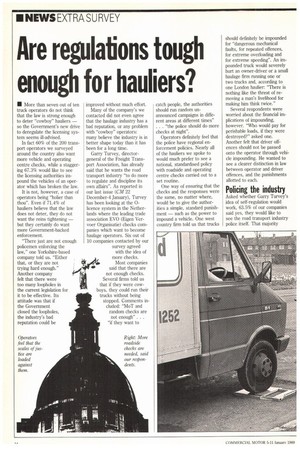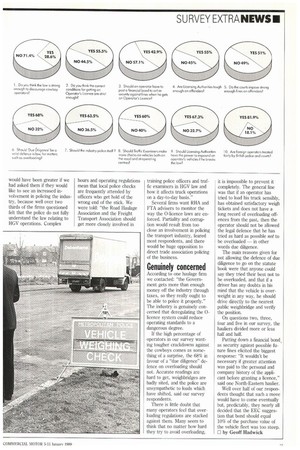Are regulations tough enough for hauliers?
Page 16

Page 17

If you've noticed an error in this article please click here to report it so we can fix it.
• More than seven out of ten truck operators do not think that the law is strong enough to deter "cowboy" hauliers — so the Government's new drive to deregulate the licensing system seems ill-advised.
In fact 60% of the 200 transport operators we surveyed around the country also want more vehicle and operating centre checks, while a staggering 67.3% would like to see the licensing authorities impound the vehicles of an operator which has broken the law.
It is not, however, a case of operators being "holier than thou". Even if 71.4% of hauliers believe that the law does not deter, they do not want the reins tightening — but they certainly do want more Government-backed enforcement.
"There just are not enough policemen enforcing the law," one Yorkshire-based company told us. "Either that, or they are not trying hard enough." Another company felt that there were too many loopholes in the current legislation for it to be effective. Its attitude was that if the Government closed the loopholes, the industry's bad reputation could be improved without much effort.
Many of the company's we contacted did not even agree that the haulage industry has a bad reputation, or any problem with "cowboy" operators: many believe the industry is in better shape today than it has been for a long time.
Garry Turvey, directorgeneral of the Freight Transport Association, has already said that he wants the road transport industry "to do more to regulate and discipline its own affairs". As reported in our last issue (CM 22 December-4 January), Turvey has been looking at the 0licence system in the Netherlands where the leading trade association EVO (Eigen Vervoer Organisatie) checks companies which want to become haulage operators. Six out of 10 companies contacted by our survey agreed with the idea of more checks.
Most companies said that there are not enough checks. Several firms told us
that if they were cowboys, they could run their
trucks without being stopped. Comments in cluded: "MoT and random checks are not enough" . .
"if they want to catch people, the authorities should run random unannounced campaigns in different areas at different times" . "the police should do more checks at night".
Operators definitely feel that the police have regional enforcement policies. Nearly all of the hauliers we spoke to would much prefer to see a national, standardised policy with roadside and operating centre checks carried out to a set routine.
One way of ensuring that the checks and the responses were the same, no matter where, would be to give the authorities a simple, standard punishment — such as the power to impound a vehicle. One west country firm told us that trucks
should definitely be impounded for "dangerous mechanical faults, for repeated offences, for extreme overloading and for extreme speeding". An impounded truck would severely hurt an owner-driver or a small haulage firm running one or two trucks and, according to one London haulier: "There is nothing like the threat of removing a man's livelihood for making him think twice."
Several respondents were worried about the financial implications of impounding, however. "Who would pay for perishable loads, if they were destroyed?" asked one. Another felt that driver offences should not be passed onto the operator through vehicle impounding. He wanted to see a clearer distinction in law between operator and driver offences, and the punishments allotted to each.
Policing the industry
Asked whether Garry Turvey's idea of self-regulation would work, 63.5% of our companies said yes, they would like to see the road transport industry police itself. That majority would have been greater if we had asked them if they would like to see an increased involvement in policing the industry, because well over two thirds of the firms questioned felt that the police do not fully understand the law relating to HGV operations. Complex hours and operating regulations mean that local police checks are frequently attended by officers who get hold of the wrong end of the stick. We were told: "the Road Haulage Association and the Freight Transport Association should get more closely involved in training police officers and traffic examiners in HGV law and how it affects truck operations on a day-to-day basis."
Several firms want RHA and FTA advisers to monitor the way the 0-licence laws are enforced. Partiality and corruption would result from too close an involvement in policing the transport industry, feared most respondents, and there would be huge opposition to direct trade association policing of the business.
Genuinely concerned
According to one haulage firm we contacted: "the Government gets more than enough money off the industry through taxes, so they really ought to be able to police it properly." The industry is genuinely concerned that deregulating the 0licence system could reduce operating standards to a dangerous degree.
If the high percentage of operators in our survey wanting tougher crackdowns against the cowboys comes as something of a surprise, the 68% in favour of a "due diligence" defence on overloading should not. Accurate readings are hard to get, weighbridges are badly sited, and the police are unsympathetic to loads which have shifted, said our survey respondents.
There is little doubt that many operators feel that overloading regulations are stacked against them. Many seem to think that no matter how hard they try to avoid overloading, it is impossible to prevent it completely. The general line was that if an operator has tried to load his truck sensibly, has obtained satisfactory weigh tickets and does not have a long record of overloading offences from the past, then the operator should not be allowed the legal defence that he has tried as hard as possible not to be overloaded — in other words due diligence.
The main reasons given for not allowing the defence of due diligence to go on the statute book were that anyone could say they tried their best not to be overloaded, and that if a driver has any doubts in his mind that the vehicle is overweight in any way, he should drive directly to the nearest public weighbridge and verify the position.
On questions two, three, four and five in our survey, the hauliers divided more or less half and half.
Putting down a financial bond, as security against possible future fines elicited the biggest response: It wouldn't be necessary if greater attention was paid to the personal and company history of the applicant before granting a licence," said one North-Eastern haulier.
Well over half of our respondents thought that such a move would have to come eventually but, predictably, they nearly all decided that the EEC suggestion that bond should equal 10% of the purchase value of the vehicle fleet was too steep. 0 by Geoff Hadwick
















































































